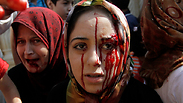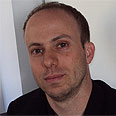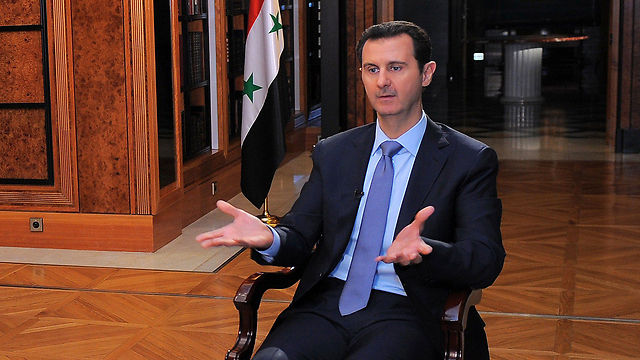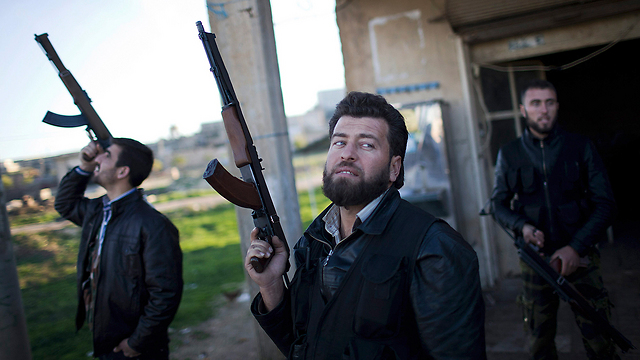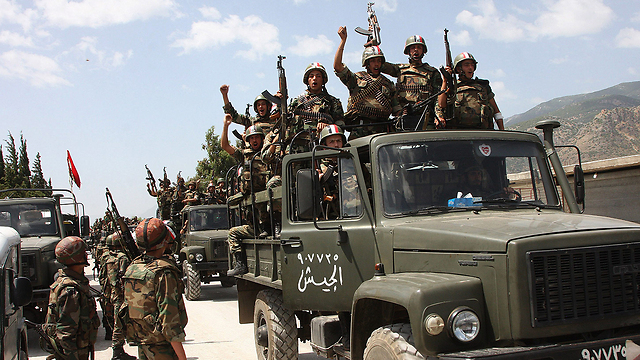- Iranian President Rohani: "The Geneva conference will fail before it even begins."
- Chairman of the Syrian National Coalition Ahmad Jarba: "Assad is going to take part in his own funeral."
- Syrian President Bashar Assad: "If we intended on surrendering, we would have done it in the beginning."
It's been a long time since Western leaders pinned so many false hopes on a peace conference with such slim chances of succeeding like the Geneva II Conference. The failure of peace conferences is guaranteed when the participating parties are not really interested in reaching an agreement, are pushed into it by external forces, or when one of the sides has no control of the ground and is incapable of imposing any order in the area he pretends to represent.
In the Geneva II Conference, all negative conditions exist. Will a comprehensive peace agreement be possible in a place where a ceasefire cannot even be reached for one day, not even on Christmas or Eid al-Adha? Here is an explanation why the chances for the success of the Geneva II conference for peace in Syria are extremely slim.
Chances smaller than success of Israel-PA talks
In a way, the Geneva conference is reminiscent of the negotiations between Israel and the Palestinians. Both sides are not serious about the efforts of peace, and the negotiations appear to be about the actual meeting. There is no trust at all between the parties, and the only goal of the negotiations is to satisfy the powers or the West, thereby guaranteeing ongoing financial support.
Mahmoud Abbas' real authority among the Palestinians is as questionable as his chances of imposing a future agreement with Israel on the ground, if it is indeed reached. The Palestinian representatives are negotiations while half of the territory under discussion, the Gaza Strip, is not in their hands. Senior IDF officials have estimated many times that if the Israeli army withdraws from the West Bank, the Palestinian Authority government will collapse and the Hamas organization will take over the territory.
In Syria the situation is even more complicated as the Syrian National Coalition has almost completely lost its ability to control the area. Therefore, it does not have the actual ability to implement any agreement.
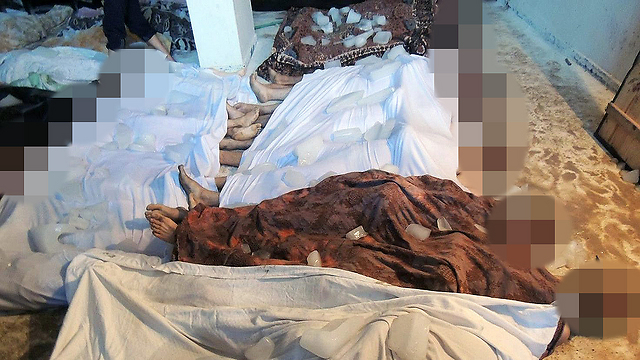
In the West's eyes, the Palestinian Authority and Syrian National Coalition represent the only chance for imposing an agreement that will lead to a secular, democratic country. But in both cases, the Western countries' dream is completely cut off from the tough reality on the ground and from the impossible gap between the sides' positions.
Who does the Syrian National Coalition represent?
The troubling question is which forces in Syria are represented in the Syrian National Coalition which will be arriving in Geneva? The al-Qaeda organizations, the significant force on the ground, don’t accept the coalition's authority. The Salafi Islamic organizations, led by the Islamic Front, doesn't see the opposition in Istanbul as their representative either.
Daash ("The Islamic State in Iraq and Greater Syria"), al-Qaeda's Iraqi wing, is waging an all-out war against all of the opposition factions and is gradually taking over all northern cities in Syria. In fact, the only force which was capable of implementing the opposition's decisions in the conference was the armed rebels' organization, the Free Syrian Army. But this body has been in a state of disintegration for several months now.
The announcements made by Free Syrian Army commander Salim Idris are transferred in a recording apparently outside of Syria. The entire territory which was controlled in the past by the Free Syrian Army is controlled by Islamic organizations, which are now fleeing as well from the Daash organization. At the last moment before the conference, Turkey and Qatar are trying to convince the Islamic organization which are not affiliated with al-Qaeda, led by the Islamic Front, to support the positions of the Syrian National Coalition.
Problematic majority
Although it was a secret ballot, the Muslim Brotherhood representatives within the Syrian National Coalition appear to have led the objections to sitting next to the Assad regime's delegation. The absence of their leader, Ali Sadreddine al-Bayanouni, from the vote ahead of the participation in Geneva II was obvious.
It should be noted that in this vote, which was held several days ago, only 75 of the 120 members were present. Fifty-eight of them voted in favor of participating, 14 voted against and two abstained. This means that the decision in favor of participating in Geneva was made by less than half of the members of the Syrian National Coalition. It's safe to estimate from the short and problematic history of the Syrian opposition in Turkey that even if a compromise is achieved, there is no guarantee that it will be approved by the majority of the Coalition members.
Unreasonable starting points
The attitudes presented by the two sides to the negotiations show that there is a completely unbridgeable gap between the sides. Syrian National Coalition Chairman Ahmad Jarba is demanding that the conference end with the downfall of the Assad regime and that he is put on trial in an international criminal court. Jarba is accusing Bashar Assad of bringing Daash (al-Qaeda) into the Syrian arena in order to prove that he is fighting terror.
Jarba even warned on Saturday that he would demand that Assad remove all his "mercenaries" from the Syrian arena: Daash and his Lebanese allies from Hezbollah. It seems that this radical stance was the only thing that could have made it possible to secure the desired majority in the coalition for participating in Geneva II.
The Syrian president declared in an interview to a Russian network, in response to Jarba's remarks, that he has no intention of arriving at the conference in order to surrender or step down. In the past he said he would accept only what he referred to as "the Syrian people's decision." About a year ago, President Assad claimed he wanted to hold general presidential elections in Syria, but several factors are delaying the "democratic" elections.
In the territories he doesn't control in northern and eastern Syria, no one will agree to participate in the elections on behalf of Assad, definitely not Islamic organizations. In the territories he controls in the western part of the country, there will be no credibility for the election process and Assad is expected to win a 97% majority again, like in the 2007 elections.
The refugee problem is also preventing the participation of about 10% of the population in the elections. About two million Syrians live in Lebanon, Jordan and Turkey today.
External forces interested in an agreement?
In spite of the smiles and handshakes between the Russian and American foreign ministers, Sergey Lavrov and John Kerry, and the compliments given in public by the West's representatives to the delegation in Geneva, one cannot overrule the possibility that in reality there is no real interest in ending the crisis in Syria.
One can even assume that it's quite the opposite and that Russia is interested in seeing the current situation continue and the Assad army, which it is arming, slowly continue to gain strength until it regains control of the entire country. In the meantime, Assad will kill tens of thousands of jihadists threatening Russia, mainly Chechens and Caucasians. The US has no objection in principle either for Shiite and Sunni terrorists, Hezbollah and al-Qaeda, continuing to destroy each other.
Saudi Arabia and the Gulf states understand very well that the Syrian opposition is arriving at Geneva II at a disadvantage. They have been trying for quite a while, unsuccessfully, to establish a moderate Islamic force which would take over the territory, and they realize that the opposition is in an extremely tough situation. They have no doubt as to the chances of the conference, and their approach is characterized by cynicism and despair.
Iran's position is no different from its rivals' position. President Hassan Rohani expressed his frustration over the fact that Iran was not invited to participate in the talks, and warned that any discussion without his country's participation was doomed to failure.
Iran is interested in taking advantage of the Syrian crisis in order to advance its nuclear project. In order to gain support from the West, Iran will try to appear as a mediating element allegedly trying to achieve reconciliation in Syria.
But on the ground Iran will continue riding two horses at the same time: Both advancing its nuclear program and helping Assad win. Several days ago, Iranian Foreign Minister Mohammad Javad Zarif visited Syria in order to coordinate position ahead of Geneva II.
Minister Zarif and President Assad say the conference's goal is to "fight terror." The Syrian National Coalition has also declared that its goal is to "fight terror." So it seems that on January 22 there will be an agreement on a war on terror, but an argument will build up on the identity of the real terrorists: The rebels or the regime.
Dr. Yaron Friedman, Ynet's commentator on the Arab world, is a graduate of the Sorbonne. He teaches Arabic and lectures about Islam at the Technion, at Beit Hagefen and at the Galilee Academic College. His book, "The Nusayri Alawis: An Introduction to the Religion, History and Identity of the Leading Minority in Syria," was published in 2010 by Brill-Leiden













